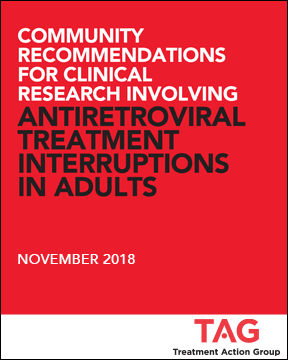TAG welcomes feedback on this report and the recommendations – please send any comments to: richard.jefferys@treatmentactiongroup.org
Introductory Summary
- Combination antiretroviral therapy (ART) is now recommended for all people with HIV. Suppression of HIV viral load to undetectable levels by ART greatly benefits individual health—causing lifespans for many people with HIV to approach those of comparable HIV-negative individuals—and eliminates the risk of most forms of HIV transmission.
- Scientists working to develop a cure for HIV infection sometimes need to conduct clinical trials in which participants are asked to temporarily interrupt ART, which contradicts the recommendations and guidelines for people with HIV under medical care.
- The use of analytical treatment interruptions (ATIs) in the setting of research is widely considered to be a necessary step for developing a cure for HIV infection or therapies with the potential to reduce the need for ART. There is also widespread, but not universal, agreement that ATIs in clinical trials can be acceptable, as long as steps are taken to maximize the safety of participants.
- Researchers have developed recommendations on the use of ATIs in collaboration with other stakeholders (including community representatives), based on a consensus workshop held at the Ragon Institute in Boston on July 9, 2018 (the recommendations were published in The Lancet HIV on March 15, 2019). The BEAT-HIV Collaboratory Community Advisory Board (CAB) is also generating a position paper on HIV cure research and ATIs, and the DARE Collaboratory CAB has outlined preferred criteria and options for extended ATIs.
- In 2014, Simon Collins, from the treatment information and advocacy organization i-Base in the United Kingdom, led a collaborative effort with TAG and Project Inform to develop community recommendations on the use of ATIs in clinical research for adults.
- With the support of the Elizabeth Taylor AIDS Foundation, TAG has undertaken a survey of community advocates and a review of parameters in current research involving ATIs in adults, in order to offer an updated community-based perspective and set of recommendations on the topic.
- The science and ethics of ATIs in HIV cure research are the subject of an increasing amount of literature. This report aims to contribute to the ongoing discussion and to add to the information available to people with HIV who may be interested in supporting this research as study participants.

